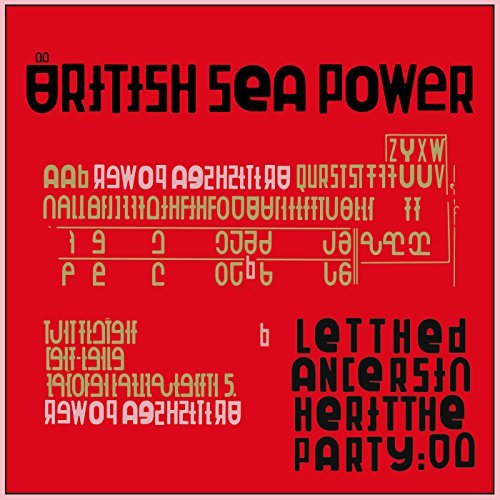About a week ago, shortly after hearing Let The Dancers Inherit The Party for the first few times – and still uncertain about it in my fanboy sort of way – my partner and I sat down to finish the third season of Halt And Catch Fire (a show about maladjusted programmers working in the earliest days of online gaming). It’s 1990, and our protagonists find themselves at a party thrown by Atari. Here’s how I remember it: the DJ throws the Pixies’ ‘Velouria’ on the single turntable, everyone starts jumping up and down, exuberantly spilling red cups of beer, maybe they’re singing along, rejoicing in the sort of ebullient community and commonality outsiders always feel when grouped together in fictions. It occurred to me then that this feeling of communion in the face of the uncertainty is exactly what British Sea Power are going for with Dancers.
But the thing is, the world presented in that scene doesn’t exist anymore, not really. As a 38-year-old Midwestern American, weaned on and formerly of college radio and red-cup, indie-rock house parties, this record evokes a rich strain of nostalgia. In consistently calling to mind – both in spirit and sonically – that era in which the CMJ charts mattered and SXSW didn’t feature a 100-foot-tall Doritos vending machine, it’s probably as “American” a record as BSP are ever likely to make. No windswept moors or Wicker Man vibes to be found here. This is a record of interiors, of cathartic gatherings around stereos, of anxious huddling around the radio.
Admittedly, this was something of a surprise, but it shouldn’t have been. Just take a look at Scott Wilkinson’s Baker’s Dozen, published on The Quietus in the run up to the album’s release: Pavement, The Pixies, Talking Heads, Teenage Fanclub – all college rock faves – peppered in amongst some oddball picks and the Baker’s Dozen Holy Trinity – Iggy, Bowie, and The Velvets. Look again, and you’ll see records regarded as follies (Iggy’s Soldier, The War Of The Worlds), discs that rank among their respective group’s most polished and accessible (Bossanova, Little Creatures), a pat best-of, and Rust Never Sleeps cited in defense of the guitar solo. Squint at the list and pieces of it start to look like a blueprint, or maybe a warning. A warning, because with BSP it’s sometimes difficult to predict which band you’re actually going to get. For those unfamiliar, theirs is a peculiarly bifurcated catalogue split between esoteric-reference-laden, slightly-off stadium rock and a sprawling, emotive strain of atmospheric post rock. (It’s not all that uncommon for casual BSP fans to embrace one and disdain the other.) Most of their records feature an assortment of both, but depending on the release, lean slightly this way or that. Lately, however, the band seems intent on reserving their more cinematic tendencies for their exceptional soundtrack work, meaning that ‘proper’ BSP LPs have become something of a showcase for their hooky choruses.
And indeed, that’s what we have here. This is essentially their Bossanova or Little Creatures, an LP that brings their skewed pop sensibilities to the fore and mostly excises the extended elegiac atmospherics and any overly wacky digressions. When these elements are present, they’ve been blended into the record’s pop concoctions – at least five of which could be ‘Velourias’ or ‘Roads To Nowhere’, were the reality of the contemporary music business more accommodating. The most immediately striking of these is ‘What You’re Doing’, a gorgeous homage to New Order that plays around with new wave tropes so elegantly you’re left wondering why it took so many releases for them to properly get around to it. But then, BSP have always been a band capable of rare beauty – nearly everything on Dancers positively shimmers, from the bombastic ‘International Space Station’ to the melancholy ‘Alone Piano’. Their only proper album with no tracks over six minutes, this is BSP at their most distilled. It’s as concise a statement as the band seems capable of, as unified and coherent as any of their soundtracks.
Nostalgia can be a powerful thing. Despite its reputation, it can be useful, can even lead to action. Having grown up in the 1980s and witnessed the end of the Cold War, I never thought that the nuclear anxiety I experienced as a child would rear its head again. But I listen to the hymn-like ‘Electric Kittens’ or the exuberant ‘Keep On Trying’,and I remember how we used to cope with it. Likewise, when I find myself dumbfounded by my country’s Trumpian present, ‘The Voice Of Ivy Lee’ does its part to remind me how we wound up with this disaster. As celebratory as it can be, a deep vein of anxiety runs through Dancers, in this way it mirrors the times we find ourselves in – like all truly great pop records should strive to do.
Here in America, British Sea Power have always been something of a non-starter. Often regarding them as a caricature of eccentric, Keep-Calm-and-Carry-On Englishness with stadium aspirations, we completely miss the point. It’s a shame. In this age of grim uncertainty, they have as much to offer Americans as they do a post-Brexit UK. Keenly political, anti-fascist, and pro-immigrant, British Sea Power mine the past to give us what we need now.


